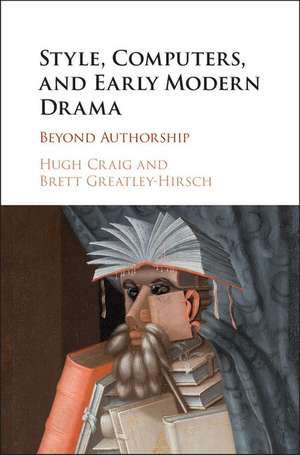Style, Computers, and Early Modern Drama: Beyond Authorship
Autor Hugh Craig, Brett Greatley-Hirschen Limba Engleză Hardback – 2 aug 2017
Preț: 542.93 lei
Preț vechi: 704.97 lei
-23% Nou
Puncte Express: 814
Preț estimativ în valută:
103.91€ • 108.19$ • 87.81£
103.91€ • 108.19$ • 87.81£
Carte indisponibilă temporar
Doresc să fiu notificat când acest titlu va fi disponibil:
Se trimite...
Preluare comenzi: 021 569.72.76
Specificații
ISBN-13: 9781107191013
ISBN-10: 1107191017
Pagini: 298
Dimensiuni: 179 x 235 x 18 mm
Greutate: 0.61 kg
Editura: Cambridge University Press
Colecția Cambridge University Press
Locul publicării:New York, United States
ISBN-10: 1107191017
Pagini: 298
Dimensiuni: 179 x 235 x 18 mm
Greutate: 0.61 kg
Editura: Cambridge University Press
Colecția Cambridge University Press
Locul publicării:New York, United States
Cuprins
1. Methods; 2. Prose and verse: sometimes 'transparent', sometimes meeting with 'a jolt'; 3. Sisters under the skin: character and style; 4. Stage properties: bed, blood, and beyond; 5. 'Novelty carries it away': cultural drift; 6. Authorship, company style, and horror vacui; 7. Restoration plays and 'the giant race, before the flood'.
Recenzii
'This is an outstanding book of major importance to the field of Shakespeare studies specifically and to the wider field of literary studies in general. As well as conveying new knowledge of exceptional interest, it is written in a style that makes it comprehensible by a wide, non-specialist readership. I anticipate that it will generate intense interest, not least because it debunks a series of current myths about authorship and the style of drama in Shakespeare's time, and introduces new methods of literary criticism.' Gabriel Egan, De Montfort University
'Hugh Craig and Brett Greatley-Hirsch make the case for computational stylistics as a source of more objective generalizations about and insights into the drama of the period. … Their approach could be a body blow to partial, idiosyncratic and subjective literary criticism and to innumerate or illogical scholars.' Emma Smith, The Times Literary Supplement
'Computers and electronic databases have revolutionized techniques of author attribution, but here Craig and Greatley-Hirsch are concerned with matters of dramatic criticism and history. Desirable attributes of investigators in 'the digital humanities' are that they should be sensitive to traditional literary and dramatic values and knowledgeable about the current state of scholarship. Craig and Greatley-Hirsch are well qualified on both counts.' MacDonald P. Jackson, Shakespeare
'Hugh Craig and Brett Greatley-Hirsch have redefined the scope of computational analyses of early modern drama and set an impressive standard for distant reading approaches to the canon.' Mark Kaethler, The Review of English Studies
'As a work of exploration in the use of sophisticated quantitative methods applied to prima facie unrelated questions of interest, Style, Computers, and Early Modern Drama is a fitting tribute to its dedicatee, John Burrows.' Thomas Merriam, Notes and Queries
'Craig and Greatley-Hirsch offer responsible, imaginative, sophisticated, and well situated claims about various aspects of early modern drama.' Jonathan P. Lamb, Modern Philology
'Style, Computers, and Early Modern Drama is uncommonly good at provoking fresh ways of looking at the field. … If machine reading at its best cues human readers to think anew, Craig and Greatley-Hirsch demonstrate on what terms, and with what tools, it does so.' Ellen Mackay, SEL Studies in English Literature 1500–1900
'… this impressive project addresses questions of ongoing scholarly inquiry from fresh perspectives and provides new models of corpus curation and experimental design that are likely to inspire future quantitative literary study.' Mattie Burkert, Renaissance Quarterly
'The project offers a number of useful provocations to scholars of early modern drama and theater … reflecting a commitment to methodological transparency that should serve as an example for practitioners of digital humanities across disciplines and time periods.' Mattie Burkert, Renaissance Quarterly
'Hugh Craig and Brett Greatley-Hirsch make the case for computational stylistics as a source of more objective generalizations about and insights into the drama of the period. … Their approach could be a body blow to partial, idiosyncratic and subjective literary criticism and to innumerate or illogical scholars.' Emma Smith, The Times Literary Supplement
'Computers and electronic databases have revolutionized techniques of author attribution, but here Craig and Greatley-Hirsch are concerned with matters of dramatic criticism and history. Desirable attributes of investigators in 'the digital humanities' are that they should be sensitive to traditional literary and dramatic values and knowledgeable about the current state of scholarship. Craig and Greatley-Hirsch are well qualified on both counts.' MacDonald P. Jackson, Shakespeare
'Hugh Craig and Brett Greatley-Hirsch have redefined the scope of computational analyses of early modern drama and set an impressive standard for distant reading approaches to the canon.' Mark Kaethler, The Review of English Studies
'As a work of exploration in the use of sophisticated quantitative methods applied to prima facie unrelated questions of interest, Style, Computers, and Early Modern Drama is a fitting tribute to its dedicatee, John Burrows.' Thomas Merriam, Notes and Queries
'Craig and Greatley-Hirsch offer responsible, imaginative, sophisticated, and well situated claims about various aspects of early modern drama.' Jonathan P. Lamb, Modern Philology
'Style, Computers, and Early Modern Drama is uncommonly good at provoking fresh ways of looking at the field. … If machine reading at its best cues human readers to think anew, Craig and Greatley-Hirsch demonstrate on what terms, and with what tools, it does so.' Ellen Mackay, SEL Studies in English Literature 1500–1900
'… this impressive project addresses questions of ongoing scholarly inquiry from fresh perspectives and provides new models of corpus curation and experimental design that are likely to inspire future quantitative literary study.' Mattie Burkert, Renaissance Quarterly
'The project offers a number of useful provocations to scholars of early modern drama and theater … reflecting a commitment to methodological transparency that should serve as an example for practitioners of digital humanities across disciplines and time periods.' Mattie Burkert, Renaissance Quarterly
Notă biografică
Descriere
This book uses computational methods and statistical analysis to challenge traditional assumptions about the plays of Shakespeare and his contemporaries.
